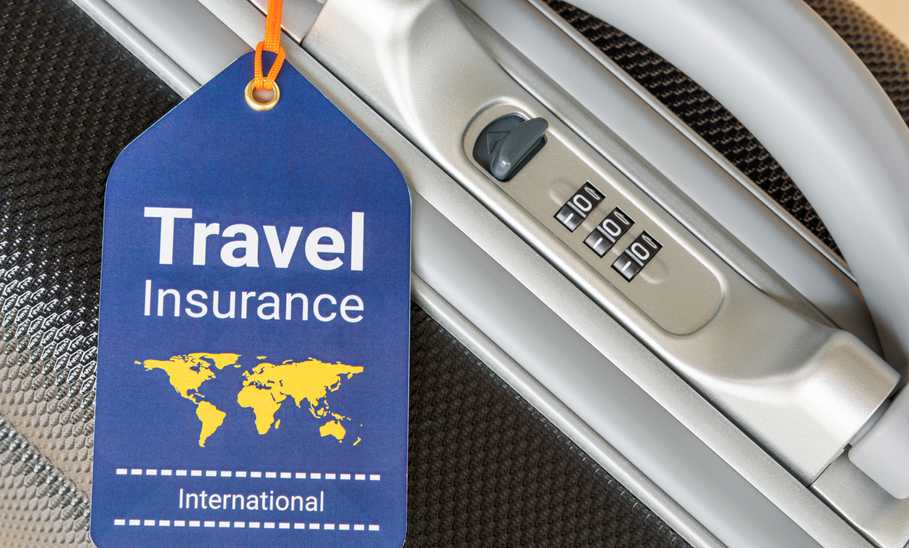Credit cards
- View all credit cards
- Banking guide
- Loans guide
- Insurance guide
- Personal finance
- View all personal finance
- Small business
- Small business guide
- View all taxes

How to Find the Best Travel Insurance
Many, or all, of the products featured on this page are from our advertising partners who compensate us when you take certain actions on our website or click to take an action on their website. However, this does not influence our evaluations. Our opinions are our own. Here is a list of our partners and here's how we make money .
Table of Contents
What travel insurance covers
How much does travel insurance cost, types of travel insurance, how to get travel insurance, what to look for in travel insurance, best travel insurance comparison sites, which insurance company is best for travel insurance, when to skip travel insurance, travel insurance, recapped.
Travel insurance can cover medical expenses, emergencies, trip interruptions, baggage, rental cars and more.
Cost is affected by trip length, pre-existing medical conditions, depth of coverage, your age and add-ons.
You can get it through credit cards or third-party companies, & can shop on travel insurance comparison sites.
Before buying, evaluate risks, know existing coverage, obtain quotes online and review policy details warily.
Skip it if you buy flexible airfare and hotels, already have coverage or only book refundable activities.
Booking travel always carries some degree of uncertainty. Travel insurance provides a safety net so you can step out with confidence. You may not need travel insurance for inexpensive trips, but it can provide a sense of security when you prepay for pricey reservations, a big international trip or travel during cold and flu season, which can be unpredictable.
According to insurance comparison site Squaremouth, travelers in 2023 spent an average of $403 for comprehensive coverage, compared to $96 for medical-only policies. Comprehensive plans typically cost between 5% and 10% of the insured trip cost.
Since that price tag is no small amount, it helps to know how to shop smart for travel insurance. Here's how to find the right travel insurance plan for you and your next adventure.
Depending on the type of coverage you’re looking for, the chart below will help you determine what to look for when selecting a policy:
Depending on the policy, travel insurance reimburses you or offers services when something goes awry. There’s even coverage for the worst-case scenario: if you die in an accident while traveling. Accidental death coverage pays your beneficiary a lump sum in that case.
Before you buy, take a little time to get familiar with different types of travel insurance products, how it’s priced, and what it covers and excludes. If you’re traveling during these uncertain times, you’ll want to make sure that the policy you select covers coronavirus-related emergencies. Usually, the more thorough the coverage, the more it will cost.
Travel insurance costs vary depending on:
Length and cost of the trip: The longer and more expensive the trip, the higher the policy cost.
Cost of local health care: High health-care costs in your destination can drive up the price of trip insurance.
Medical conditions you want covered: Conditions you already have will increase the cost of travel insurance coverage.
Amount and breadth of coverage: The more risks a policy covers, the more it will cost.
Your age: Generally the older you are, the higher the price.
Any optional supplement you add to your policy : Cancel For Any Reason , Interrupt For Any Reason and more.
Keep these factors in mind when considering different travel insurance options.
You’ll find a wide selection of travel protection plans when you shop for a policy.
Typically, travel insurance is sold as a package, known as a comprehensive plan, which includes a variety of coverage.
Here are seven of the most common types of travel insurance:
Travel medical insurance
These plans provide health insurance while you’re away from home. Although in some ways these policies work like traditional health plans, generally you cannot use travel health insurance for routine medical events. For example, a routine medical checkup is usually not covered. In addition, these policies often include limitations on coverage and exclusions for pre-existing conditions.
Although most travel insurance plans cover many recreational activities, such as skiing and horseback riding, they often exclude adventure sports, such as skydiving or parasailing, or competition in organized sporting events. You may need to buy a special travel policy designed for adventure or competitive sports.
International travel insurance
Most likely, your U.S.-based medical insurance will not work while you’re traveling internationally, and Medicare does not provide any coverage once you leave the United States outside of a few very specific exemptions. If you plan on traveling abroad, purchasing travel medical insurance could make a lot of sense.
» Learn more: Travel medical insurance: Emergency coverage while you travel internationally
Trip cancellation, interruption and delay
Trip cancellation coverage reimburses you for prepaid, nonrefundable expenses if the tour operator goes out of business or you have to cancel the trip for one of the covered reasons outlined in the policy, such as:
Your own illness.
The illness or death of a family member who’s not traveling with you.
Natural disasters.
Trip interruption insurance covers the nonrefundable cost of the unused portion of the trip if it is interrupted due to a reason outlined in the policy.
Trip delay coverage reimburses you for expenses such as lodging and meals if you’re delayed during a trip (e.g., your flight gets canceled due to weather ).
Many package policies cover all three. These policies are different from the cancellation waivers that cruise lines and tour operators offer, the Insurance Information Institute says. Waivers are cheap, ranging from $40 to $60, and often include restrictions. For example, according to the institute, waivers might not refund your money if you cancel immediately before departure. Waivers are technically not insurance policies.
Some companies offer additional layers of coverage at extra cost. “Cancel For Any Reason” coverage will reimburse a large part of the trip cost, no matter why you back out. And some companies let you pay extra to cover pre-existing conditions if you cancel for medical reasons.
Some insurers and comparison sites let you customize a policy by choosing types of coverage a la carte. For example, TravelInsurance.com is a comparison site that provides quotes from different providers.
Baggage and personal belongings
How does lost luggage insurance work? This coverage reimburses you for baggage and personal belongings that are lost, stolen or damaged during the trip. Some plans also reimburse you for extra expenses if you experience a baggage delay for more than a certain period, such as 12 hours.
Your renters or homeowners insurance may cover personal belongings while you are traveling. It’s best to review your homeowners insurance policy to determine the level of coverage it provides so you do not end up paying for a benefit you already have.
» Learn more: Baggage insurance explained
Emergency medical assistance, evacuation and repatriation
This coverage pays medical expenses if you get sick or injured on a trip . Medical evacuation coverage pays for transporting you to the nearest hospital, and medical repatriation pays for flying you to your home country.
» Learn more: Can I get travel insurance for pre-existing medical conditions?
24-hour assistance
This service is included with many package plans. The insurer provides a 24-hour hotline that you can call when you need help, such as booking a flight after a missed connection, finding lost luggage, or locating a doctor or lawyer.
Generally, travel insurance companies do not cover sports or any activity that can be deemed risky. If you’re thinking of incorporating adventurous activities into your vacation, choose a plan that includes adventure sports coverage.
Most travel insurers cover a wide array of services, but the specific options vary. Some plans include concierge services, providing help with restaurant referrals, tee time reservations and more. Many services also offer information before the trip, such as required vaccinations. The only way to know what’s included is to read the policy.
» Learn more: Should you insure your cruise?
Accidental death and dismemberment insurance
This coverage pays a lump sum to your beneficiary, such as a family member, if you die in an accident while on the trip. Accidental death and dismemberment insurance policies also pay a portion of the sum to you if you lose a hand, foot, limb, eyesight, speech or hearing. Some plans apply only to accidental death in a plane.
This coverage may be duplicative if you already have sufficient life insurance, which pays out whether you die in an accident or from an illness. You may also already have accidental death and dismemberment insurance through work, so it's best to check your policies to ensure you’re not overpaying.
» Learn more: NerdWallet's guide to life insurance
Rental car coverage
Rental car insurance pays for repairing your rental car if it’s damaged in a wreck, by vandals or in a natural disaster. The coverage doesn't include liability insurance, which pays for damage to other vehicles or for the medical treatment of others if you cause an accident and are held responsible.
Ask your car insurance company whether your policy will cover you when renting cars on the trip. U.S. car insurance policies generally don’t cover you when driving in other countries, except Canada.
Car insurance requirements are complex because they vary among countries. You can usually purchase liability insurance from the rental car company. Learn about car insurance requirements by searching for auto insurance by country on the U.S. Embassy website .
» Learn more: Best credit cards for rental car coverage
A note about single vs. long-term policies
Single trip insurance plans are a great option for those going on a single trip for a specific length of time (e.g., a two-week vacation) and then returning home. The price of the policy is usually determined by the cost of the trip.
Long-term travel policies cover you for multiple trips, but there are limitations to how long you can be away from home, if you can return home during your travels and how many trips you can take. In addition, trip cancellation and interruption coverage is either not offered or capped at a dollar amount that can be significantly below the total cost of all the trips taken during the covered period.
Long-term travel insurance plans — often called 'multi-trip' or 'annual travel insurance' — are a suitable option for those who travel often and are satisfied with the amount of trip cancellation coverage for all the trips they take over the duration of the policy.
» Learn more: How annual (multi-trip) travel insurance works
Below, we include how to obtain travel insurance, along with the pros and cons of each option.
Some credit cards offer trip cancellation and rental car insurance if you use the card to book the trip or car.
When you book a trip with your credit card, depending on the card you use, you may already receive trip cancellation and interruption coverage.
» Learn more: 10 credit cards that provide travel insurance
Here are a handful of credit cards that offer varying levels of travel insurance coverage for purchases made with the card.

on Chase's website

on American Express' website

• Trip delay: Up to $500 per ticket for delays more than 12 hours.
• Trip cancellation: Up to $10,000 per person and $20,000 per trip. Maximum benefit of $40,000 per 12-month period.
• Trip interruption: Up to $10,000 per person and $20,000 per trip. Maximum benefit of $40,000 per 12-month period.
• Baggage delay: Up to $100 per day for five days.
• Lost luggage: Up to $3,000 per passenger.
• Travel accident: Up to $500,000.
• Rental car insurance: Up to $75,000.
• Trip delay: Up to $500 per ticket for delays more than 6 hours.
• Travel accident: Up to $1 million.
• Rental car insurance: Up to the actual cash value of the car.
• Trip delay: Up to $500 per trip for delays more than 6 hours.
• Trip cancellation: Up to $10,000 per trip. Maximum benefit of $20,000 per 12-month period.
• Trip interruption: Up to $10,000 per trip. Maximum benefit of $20,000 per 12-month period.
Terms apply.
Pros: Coverage is free.
Cons: You can’t customize the insurance to meet your needs. Most credit cards offer secondary car rental insurance, which pays for the costs not covered by your regular car insurance plan.
Travel agents and travel reservation sites
You can buy travel insurance when you book your flight, hotel and car rental.
Pros: Buying is as quick and easy as clicking “yes” when you book reservations. Coverage is inexpensive.
Cons: You can’t customize the coverage.
» Learn more: Airline travel insurance vs. independent travel insurance
Travel insurance comparison sites
You can compare different policies and review quotes at once based on the trip search criteria you’ve input into the search form. Examples include marketplaces like Squaremouth or TravelInsurance.com.
Pros: You can choose a policy that fits your needs and compare policies and pricing in one place.
Cons: Comparing multiple policies takes time.
Travel insurance companies
You can purchase travel insurance directly from an insurance provider.
Pros: You can choose a policy that fits your needs. Many travel insurer websites also offer information to help you understand the coverage.
Cons: You’ll need to go to multiple websites to compare coverage and pricing.
» Learn more: The best travel insurance companies right now
Keep these tips in mind when you’re considering a trip insurance policy.
Evaluate the financial risks you face when traveling. Can you bear those costs yourself, or do you want insurance?
Examine what coverage you already have: Does your credit card offer travel insurance? Do you have renters or homeowners insurance to cover belongings? What is the deductible? Will your health plan cover you in all the locations where you travel?
Get quotes for trip insurance online. Choose a package of the benefits you need and compare prices for similar coverage among carriers.
Narrow your choices and then read the policy fine print to understand what’s covered, what’s excluded and the limits on coverage. You may find that the lowest-priced policy is too restrictive and that paying a little more gets you the coverage you need. Or you might find that the cheapest, most basic policy fits the bill.
If you don’t know which provider to go with, it makes sense to browse a list of plans on a travel insurance comparison site. These online marketplaces will often include plans from the best travel insurance companies along with customer reviews.
Squaremouth

Compare plans from more than 30 providers.
Over 86,000 customer reviews of insurers.
Under its Zero Complaint Guarantee, Squaremouth (a NerdWallet partner) will remove a provider if any customer complaint isn't resolved to its satisfaction.
Has a filter option to see policies that provide COVID-coverage.
TravelInsurance.com

Compare plans from 13 providers.
See good and poor customer ratings and reviews for each insurer when you receive quotes.
“Learning Center” includes travel insurance articles and travel tips, including important how-to information.
Quotes provided from each provider include a link to COVID-19 FAQs, making it easy for customers to review what’s covered or not.
InsureMyTrip

Compare plans from more than two dozen providers.
More than 70,000 customer reviews.
“Anytime Advocates” help customers navigate the claim process and will work on behalf of the customer to help with appealing a denied claim.
Includes a link to plans that offer COVID coverage.

Compare plans from 11 providers.
Search coverage by sporting activity, including ground, air and water sports.
Many types of plans available for students, visiting family members, new immigrants, those seeking COVID quarantine coverage and more.

Compare different insurance plans from 35 providers.
Over 5,600 customer reviews on Trustpilot, with an average 4.9 stars out of five.
Formerly known as AardvarkCompare, AARDY includes a “Travel Insurance 101” learning center to help customers understand various policies and benefits.
Quote search results page includes COVID-coverage highlighted in a different color to make it easier for customers to review related limits.
Whether you’re looking for an international travel insurance plan, emergency medical care, COVID coverage or a policy that includes extreme sports, these providers have you covered.
Our full analysis and more details about each organization can be found here: The Best Travel Insurance Companies Today .
Allianz Global Assistance .
Travel Guard by AIG .
USI Affinity Travel Insurance Services .
Travel Insured International .
World Nomads .
Berkshire Hathaway Travel Protection .
Travelex Insurance Services .
Seven Corners .
AXA Assistance USA .
There are a few scenarios when spending extra on travel insurance doesn't really make sense, like:
You booked flexible airline tickets.
Your hotel room has a good cancellation policy.
It's already included in your credit card.
You haven't booked any nonrefundable activities.
» Learn more: When you don't need travel insurance
Yes, especially for nonrefundable trips and travel during the COVID-era. Whether you purchase a comprehensive travel insurance policy or have travel insurance from your credit card, you shouldn't travel without having some sort of travel protection in place to safeguard you and your trip. Travel insurance can protect you in case of an unexpected emergency such as a canceled flight due to weather, a medical event that requires hospitalization, lost luggage and more.
There are many good travel insurance policies out there and a policy that may be great for you may not be good for someone else. Selecting the best plan depends on what coverage you would like and your trip details.
For example, World Nomads offers a comprehensive travel insurance policy that has excellent coverage for adventure sports. Allianz provides coverage for trips of varying lengths of time through its single trip plans and multi-trip plans. Some providers offer add-on options like Cancel For Any Reason travel insurance. If you’re not sure which plan to go with, consider looking at trip insurance comparison sites like Squaremouth or Insuremytrip.
Yes, you can. However, it's better to purchase it sooner rather than later, ideally right after booking your trip because the benefits begin as soon as you purchase a policy.
Let’s say you’re going on a trip in a month and a week before departure, you fall and break your leg. If you’ve purchased a travel insurance policy, you can use your trip cancellation benefits to get your nonrefundable deposit back.
Most comprehensive travel insurance plans offer trip cancellation, trip interruption, emergency medical and dental, medical evacuation, trip delay and lost luggage coverage. Many plans offer COVID coverage, but you’ll always want to check to ensure that the policy you choose provides that benefit if you’re traveling during these times. Some plans may also allow you to add features like Cancel For Any Reason travel insurance.
It depends which credit card you have. Premium travel cards like the Chase Sapphire Reserve® and The Platinum Card® from American Express offer travel insurance benefits if you book a trip using your card or points.
However, the coverage provided by the credit cards is usually lower than if you purchased a standalone policy. Review the travel insurance benefits on your credit card and check that the limits are adequate before foregoing from purchasing a separate plan.
Let’s say you’re going on a trip in a month and a week before departure, you fall and break your leg. If you’ve purchased a travel insurance policy, you can use your
trip cancellation benefits
to get your nonrefundable deposit back.
It depends which credit card you have. Premium travel cards like the
Chase Sapphire Reserve®
The Platinum Card® from American Express
offer travel insurance benefits if you book a trip using your card or points.
Unpredictability is one of the mind-opening joys of travel, but travel insurance should contain no surprises. The time you spend to understand your options will be well worth the peace of mind as you embark on your next adventure.
Whether you’re seeking a single or a long-term policy, each travel insurance option offers different strengths and weaknesses. Choosing the right policy depends on your trip needs, your budget and how important various benefits are to you.
Keep reading
If you want to dig in deeper to world of travel insurance, these resources will point you in the right direction.
What is travel insurance?
How much is travel insurance?
Is travel insurance worth it?
What does travel insurance cover?
Does travel insurance cover COVID?
Insurance Benefit: Trip Delay Insurance
Up to $500 per Covered Trip that is delayed for more than 6 hours; and 2 claims per Eligible Card per 12 consecutive month period.
Eligibility and Benefit level varies by Card. Terms, Conditions and Limitations Apply.
Please visit americanexpress.com/benefitsguide for more details.
Underwritten by New Hampshire Insurance Company, an AIG Company.
Insurance Benefit: Trip Cancellation and Interruption Insurance
The maximum benefit amount for Trip Cancellation and Interruption Insurance is $10,000 per Covered Trip and $20,000 per Eligible Card per 12 consecutive month period.
Insurance Benefit: Baggage Insurance Plan
Baggage Insurance Plan coverage can be in effect for Covered Persons for eligible lost, damaged, or stolen Baggage during their travel on a Common Carrier Vehicle (e.g., plane, train, ship, or bus) when the Entire Fare for a ticket for the trip (one-way or round-trip) is charged to an Eligible Card. Coverage can be provided for up to $2,000 for checked Baggage and up to a combined maximum of $3,000 for checked and carry-on Baggage, in excess of coverage provided by the Common Carrier. The coverage is also subject to a $3,000 aggregate limit per Covered Trip. For New York State residents, there is a $2,000 per bag/suitcase limit for each Covered Person with a $10,000 aggregate maximum for all Covered Persons per Covered Trip.
Underwritten by AMEX Assurance Company.
Insurance Benefit: Car Rental Loss & Damage Insurance
Car Rental Loss and Damage Insurance can provide coverage up to $75,000 for theft of or damage to most rental vehicles when you use your eligible Card to reserve and pay for the entire eligible vehicle rental and decline the collision damage waiver or similar option offered by the Commercial Car Rental Company. This product provides secondary coverage and does not include liability coverage. Not all vehicle types or rentals are covered. Geographic restrictions apply.
Underwritten by AMEX Assurance Company. Car Rental Loss or Damage Coverage is offered through American Express Travel Related Services Company, Inc.
How to maximize your rewards
You want a travel credit card that prioritizes what’s important to you. Here are some of the best travel credit cards of 2024 :
Flexibility, point transfers and a large bonus: Chase Sapphire Preferred® Card
No annual fee: Wells Fargo Autograph℠ Card
Flat-rate travel rewards: Capital One Venture Rewards Credit Card
Bonus travel rewards and high-end perks: Chase Sapphire Reserve®
Luxury perks: The Platinum Card® from American Express
Business travelers: Ink Business Preferred® Credit Card
Bank of America® Customized Cash Rewards credit card

Earn 3% cash back when you choose online shopping plus earn a $200 online cash rewards bonus after you make at least $1,000 in purchases in the first 90 days of account opening.


Personal Finance
Best travel insurance companies for 2024.

Our evaluations and opinions are not influenced by our advertising relationships, but we may earn a commission from our partners’ links. This content is created by TIME Stamped, under TIME’s direction and produced in accordance with TIME’s editorial guidelines and overseen by TIME’s editorial staff. Learn more about it .
Planning to travel in 2024? You're not alone. According to the U.S Travel Association , a trade group, travel has bounced back after the pandemic, with Americans forecasted to spend a staggering $1.09 trillion on domestic and international travel this year. This surge, however, comes with its challenges, as travel costs have soared to unprecedented heights, fueled by increased demand and price inflation.
In this era of heightened travel expenses, safeguarding your journey is paramount. Enter travel insurance, a crucial shield against the uncertainties that may arise during your adventures. To help you navigate this crucial decision, we've compiled a list of the best travel insurance companies. Join us as we explore these top choices, ensuring your travels are not only memorable but also financially protected.
Compare the best travel insurance companies 2024
Which travel insurance coverages are available.
Travel insurance policies typically include the following coverages.
- Emergency medical expenses . This helps cover the cost of care if you or anyone insured by the policy has a medical emergency during your trip.
- Trip cancellation . This covers the cost of your trip if it's canceled due to one of the reasons listed on the policy contract. You may also have an option for "cancel for any reason," which provides coverage if the trip is canceled, regardless of the reason why.
- Trip interruption . This covers costs related to a shortening of your trip. These costs might include reimbursement of prepaid hotel bookings, airline change fees, or extra accommodations needed during your trip home.
- Emergency medical transport . This covers the cost of transportation to the nearest medical facility if you have a medical emergency during your travel.
- Luggage damage . This provides coverage if your luggage is damaged or lost during travel.
- Travel delay . This covers costs associated with a significant delay to your travel, including additional accommodations and meals.
Our recommendations for the best travel insurance companies
Best for adventure enthusiasts: travelex.

Travelex Travel Insurance
The Travelex “Basic” plan provides $15,000 of medical and $10,000 of trip cancellation coverage. These coverage amounts are lower than those offered by other companies in our review. However, higher limits are available by selecting the company’s “Select” plan.
Among its upgrade options, Travelex offers adventure sports coverage for those whose itinerary includes such adrenaline-rush activities as zip lining, skydiving, or mountain climbing. This coverage can be added to any Travelex plan.
It’s also worth noting that Travelex is one of the highest-rated travel insurance providers on Trustpilot , having earned 4.1 out of five stars (as of Feb. 14, 2024). One recent reviewer noted, "I've always been skeptical of trip insurance and all the promises of straightforward claim processes, but I was blown away with how responsive, simple, and logical the Travelex was. I decline all trip insurance for any travel booking I do now and only use Travelex. Cheaper, more efficient, less red tape. What's not to love?”
Best standard coverage package: Generali Global Assistance

Generali Global Assistance
Generali Global Assistance is a European company with insurance services focusing on travel and identity protection. Its “Standard” plan for travel insurance provides $50,000 of medical expense coverage and trip cancellation coverage for 100% of the insured value.
The plan also includes travel delay, baggage damage, baggage delay, and missed connection coverage. Options such as rental car collision damage and upgrade plans allow you to travel with even more coverage.
Generali has 3.4 out of five stars with Trustpilot (accessed Feb. 14, 2024).
Best for “cancel for any reason” coverage: AXA Travel Insurance

AXA Travel Insurance
Many American consumers may not immediately recognize AXA Travel Insurance , but the company is a multinational financial services giant headquartered in France. Its “Silver” plan—AXA’s entry-level travel insurance offering—includes coverage for $25,000 of emergency medical expenses and 100% of the insured trip cost if the trip is canceled. Additional coverages include trip delay, missed connection, medical evacuation, and baggage coverage.
The company’s “Platinum” plan provides “cancel for any reason” trip cancellation coverage. This means you can cancel your trip for any reason—personal, professional, medical, family, or other—and expect to receive reimbursement. This contrasts with standard trip cancellation coverage, in which the cancellation must be for one of the specific reasons stated in the policy contract. The “Platinum” plan also includes higher amounts of emergency medical expenses and other coverages.
AXA has 2.9 out of 5 stars in its Trustpilot rating (accessed Feb. 14, 2024).
Best for spontaneous travelers: AIG Travelguard

AIG Travel Guard
AIG is a leading global provider of insurance for both individuals and businesses. Its Travelguard “Essential” plan offers $15,000 of emergency medical coverage and trip cancellation coverage for 100% of the insured cost of the trip. Higher coverage amounts are available with the company’s “Preferred” and “Deluxe” plans.
AIG Travelguard also offers its unusual “Pack N’ Go” plan, designed for last-minute travelers who don't need trip cancellation coverage. This plan includes up to $1,000 of trip interruption and $25,000 of medical expense coverage, along with coverages for trip delays, missed connections, and lost luggage.
AIG promises quotes on its website in less than two minutes, making it easy to include Travelguard in your comparison shopping. Travelguard has 1.7 out of 5 stars on Trustpilot , though this is based on only 64 reviews (accessed Feb. 14, 2024).
Best for international travel: Allianz

Allianz Travel Insurance
Traveling outside of the U.S.? You’ll want to work with an insurer that offers not only robust coverage, but a variety of plans and options that can fit your needs. Allianz Global Assistance (Allianz Travel) is one such company.
Its “Basic” plan includes $10,000 of both trip interruption and emergency medical expense coverage. The company offers several plans with higher coverage, along with an “Emergency Medical” plan focused primarily on medical coverage. Allianz also offers several annual policy plans for those who intend to travel multiple times a year. And if you’re considering renting a car during your international trip, you can add an optional damage and theft coverage.
The company’s “OneTrip Prime” plan extends coverage for free to children under age 17 who are traveling with a parent or grandparent, making it ideal for international family vacations. Allianz claims the plan is its most popular, with up to $100,000 of trip cancellation and $50,000 of emergency medical coverage.
Allianz earns 4.4 out of five stars in its Trustpilot rating (accessed Feb. 14, 2024), including 75% five-star reviews.
Best for medical coverage: Seven Corners

Seven Corners
Medical expense coverage is an important feature of travel insurance. This is especially true if you journey outside of the U.S., where your personal health insurance may not provide coverage.
Seven Corners is an excellent choice for those seeking generous medical coverage in a travel insurance plan. Its Basic policy provides up to $100,000 of emergency medical expenses, which is more than any other plan in our review. It also provides up to $250,000 of coverage for emergency evacuation, which helps reimburse your costs of transportation to a qualified medical facility if you have a serious illness or injury during your trip.
Seven Corners has a Trustpilot rating of 4.2 out of 5.0 stars (accessed Feb. 14, 2024).
Best for luxury travel: Berkshire Hathaway

Berkshire Hathaway Travel Insurance
Berkshire Hathaway is one of the country’s largest companies (currently seventh on the Fortune 500). It’s also the parent company of auto insurance giant GEICO.
Berkshire Hathaway’s “ExactCare Value” policy plan includes $15,000 of medical coverage and trip cancellation coverage of 100% of the insured value of the trip. The plan also includes coverage for lost baggage, baggage delay, trip delay, and emergency evacuation.
Berkshire Hathaway offers a specialized insurance plan for luxury travel. This plan features higher medical and trip cancellation coverage limits, $2,500 worth of lost baggage coverage, $35,000 of car rental collision coverage, and 24/7 worldwide travel assistance.
Berkshire Hathaway Travel Insurance does not currently have a Trustpilot rating (accessed Feb. 14, 2024).
Best for cruises: Nationwide

Nationwide Travel Insurance
Nationwide is one of the country's most recognizable insurance brands, with policies available for homes, cars, and businesses. The company also offers travel insurance.
Its “Single-trip Essential” travel insurance plan provides $75,000 in medical emergency coverage. This is the most coverage of any of the companies in our review. Nationwide’s $10,000 limit for trip cancellation is lower than that of other plans, however.
Higher limits are available with its “Prime” plan, along with a cancel-for-any-reason option that pays 75% of the insured trip cost. The plan also includes a variety of additional coverages, such as trip delay, baggage delay, emergency medical evacuation, and optional rental car coverage.
Nationwide also offers a separate, specialized travel insurance policy for those embarking on cruises . Besides expected coverages such as trip cancellation and emergency medical, it covers itinerary changes, mechanical breakdown, and missed connections.
Nationwide has earned 1.5 out of 5 stars in its Trustpilot rating, based on only 42 reviews (accessed Feb. 14, 2024).
Best for amateur athletes: Tin Leg

Tin Leg Travel Insurance
Tin Leg travel insurance policy plans are underwritten by Berkshire Hathaway and other companies. Its “Economy” plan includes trip cancellation coverage at 100% of the insured cost and $20,000 of emergency medical coverage. The company offers a variety of additional travel insurance plans with varying levels of coverage.
If you’re traveling to participate in a sports event and bringing your expensive gear, Tin Leg could be a great choice. Its “Economy” plan includes coverage for loss of, or damage to, sporting equipment (such as a bicycle or skis). It also reimburses your event registration fees if your trip is canceled or interrupted.
Tin Leg has a Trustpilot rating of 1.5 out of 5 stars (accessed Feb. 14, 2024), though this is based on only 26 reviews.
Methodology
To develop our recommendations, we gathered information about several leading travel insurance providers from their websites and third-party reviews, where available. We focused on the range of essential coverages, including emergency medical coverage and trip cancellation coverage, along with the availability of 24/7 customer support during travel. Where it existed, we noted each company’s policy cancellation terms.
We reviewed the most economical plan for each company that included both medical and trip cancellation coverage. We also noted optional coverages and upgraded plans that provide higher levels of coverage or specialty coverages for niche travel.
Policy cost information is based on a party of two U.S. travelers, age 30, traveling to the United Kingdom for seven days, and a total trip cost of $6,000. Quotes were obtained on each company’s website.
This information is for comparison purposes only. Please verify policy details before purchasing.
How to select the best travel insurance company
Follow these tips to choose the best travel insurance company for your needs.
Determine your needs
Your travel insurance needs for a Caribbean cruise may differ significantly from those for a backpacking trip through the Swiss Alps. Your first step should be to outline your travel expense budget and list the activities in which you plan to participate (note that some policies include optional coverage for certain activities, such as adventure sports). Also, consider your health status, as some policies require you to pay extra for certain pre-existing health conditions.
Investigate your travel insurance options
Check if you might already have some travel insurance readily available to you. Some credit card companies offer coverage if you use their card to pay for your trip. Coverage may also be available from a tour operator or an airline. You can also get recommendations from a travel agent or an independent insurance agent.
Compare available features and coverage amounts
You'll discover that each travel insurance provider offers varying levels of standard coverage, such as trip cancellation and emergency medical expense, along with optional coverages. They typically also offer multiple plans (think "good," "better," and "best"). Review these and select a few providers that offer the coverages you need.
Get quotes from multiple companies
As with any other type of insurance, travel insurance costs vary among companies. Check with at least three or four to ensure that you're getting the coverage you want at a price you can afford.
How do I file a travel insurance claim?
If you need to file a travel insurance claim, call the insurance company. Each company has its own process for claim filing. You'll want to be sure you have the proper claim forms and understand what supporting documentation the company requires. Be sure to follow the company's instructions for submitting your claim request.
It can take several weeks for a travel insurance claim to be paid. Be sure to watch for any follow-up requests from your insurer (such as requests for additional documentation) and respond promptly to avoid unnecessary delays.
Time STAMP: Travel is more expensive than ever. Protect your trip with travel insurance
Business and pleasure travel alike have bounced back from the pandemic. However, traveling has also become much more expensive, thanks to inflation and increased demand. If you plan to head to some far-off destination—whether by air, road, rail, or ship—consider buying travel insurance. A policy reimburses covered medical costs, trip interruption, and other snags that may befall your trip.
Frequently asked questions (FAQs)
How is your travel insurance cost determined.
Your travel insurance cost will vary based on the amount of coverage purchased, the number of travelers, the age of the travelers, and your trip destination. Travel insurance costs also vary by insurance company, underscoring the need to shop around for coverage.
I’m concerned about getting sick while traveling. What insurance should I look for?
If you’re concerned about getting sick, be sure to choose a policy that includes coverages such as emergency medical (which helps pay for your medical expenses) and emergency medical transport (which helps pay for transportation to a hospital).
Do I need travel insurance for a cruise?
Travel insurance is worth considering for a cruise. As insurer Allianz notes, a policy can help you recoup costs if you need to cancel at the last minute, have a medical emergency while on board or at a stop (regular health insurance may not provide coverage outside of the U.S.), or if you miss the ship all together due to a delay by your airline.
Is there travel insurance for multiple trips?
If you’re planning to take multiple trips in a single year, you might want to consider multi-trip insurance (also called “annual” travel insurance). This type of policy typically provides trip interruption, emergency medical expense, trip delay, and other coverages at a price that’s less than buying a policy for each trip.
Does my credit card offer travel insurance?
Some credit cards do offer varying levels of travel insurance, including trip interruption, medical expense, trip delay, and emergency evacuation coverage. Check your credit card terms and conditions or benefits statement to understand what coverage may be provided.
The card_name card offers one of the best portfolios of travel insurance benefits, including $100,000 of emergency transportation coverage, $2,500 of emergency medical and dental coverage, and up to $20,000 of trip interruption coverage.
The information presented here is created by TIME Stamped and overseen by TIME editorial staff. To learn more, see our About Us page .
Featured Articles

Comprehensive Car Insurance: Meaning & Coverage
Comprehensive is part of a full coverage car insurance policy. it provides financial protection if your car is stolen or damaged..

Credit Card Rental Car Insurance: Essential Guide 2024
Credit card rental car insurance saves money by declining rental car add-ons. learn how it works, which cards offer it, primary vs. secondary, and more..


What Is the Difference Between Term vs. Permanent Life Insurance (And How to Choose)
Term life insurance covers a certain number of years; permanent life insurance continues for your lifetime, provided you pay the agreed premiums..

Six Types of Life Insurance, Explained
Learn about the range of life insurance types, what their key features are, and which might be right for you..
Advertiser Disclosure
Many of the credit card offers that appear on this site are from credit card companies from which we receive financial compensation. This compensation may impact how and where products appear on this site (including, for example, the order in which they appear). However, the credit card information that we publish has been written and evaluated by experts who know these products inside out. We only recommend products we either use ourselves or endorse. This site does not include all credit card companies or all available credit card offers that are on the market. See our advertising policy here where we list advertisers that we work with, and how we make money. You can also review our credit card rating methodology .
When To Buy Travel Insurance and How To Best Time Your Purchase
Jessica Merritt
Editor & Content Contributor
103 Published Articles 541 Edited Articles
Countries Visited: 4 U.S. States Visited: 23
170 Published Articles 807 Edited Articles
Countries Visited: 35 U.S. States Visited: 25
Stella Shon
News Managing Editor
116 Published Articles 786 Edited Articles
Countries Visited: 25 U.S. States Visited: 22

Table of Contents
What is travel insurance, when to buy travel insurance, is credit card travel insurance enough, final thoughts.
We may be compensated when you click on product links, such as credit cards, from one or more of our advertising partners. Terms apply to the offers below. See our Advertising Policy for more about our partners, how we make money, and our rating methodology. Opinions and recommendations are ours alone.
Timing is key when buying travel insurance. It’s best to buy travel insurance within 2 weeks of making your first trip payment . You can buy travel insurance at any time, even after departure with some travel insurance providers. Still, the coverage and policy pricing is better when you buy travel insurance shortly after booking .
The sooner you buy travel insurance, the sooner you’re covered for your travel insurance policy, whether the tour company goes out of business or you get sick before your trip.
Let’s look at the best time to buy travel insurance and the advantages you get when you purchase your travel insurance policy right after booking.
Travel insurance is a type of insurance coverage that offers financial protection and assistance when you’re traveling . Benefits often include trip cancellation, trip interruptions, medical emergencies, baggage loss or delay, and rental car coverage.
The best time to buy travel insurance is within 2 weeks of making your first travel payment , whether that’s booking a flight or putting down a cruise deposit. Generally, any time you make a nonrefundable travel deposit, it’s a good idea to get travel insurance shortly thereafter.
For example, you should get travel insurance after you buy nonrefundable airfare, or when cancellation penalties kick in for cruises or tours.
Benefits of Buying Travel Insurance When You Book
Buying travel insurance shortly after booking gives you immediate coverage for your nonrefundable travel expenses . While you don’t have to get travel insurance right at the booking process, earlier is better. Once you get travel insurance, you’re covered when a trip has to be canceled due to covered reasons.
When you buy travel insurance at booking, you’ll maximize your coverage period for trip cancellation insurance. As long as your trip cancellation insurance is active, you’re covered if you need to cancel your travel due to a covered reason such as illness, injury, death of a family member, natural disaster, or job loss.
Also, your coverage options are usually better when you purchase travel insurance shortly after booking. Some travel insurance companies consider the 2 weeks after booking travel arrangements an advantage period and offer additional coverage or options during this period.
For example, some travel insurance policies offer preexisting medical condition coverage if purchased shortly after booking. If you want preexisting medical condition coverage, you may need to purchase your travel insurance either before or within a day of your final trip payment.
In an advantage period, insurance providers may also offer coverage for the financial default of travel suppliers and may allow you to add optional coverage such as cancellation insurance.
You also lock in pricing when you purchase travel insurance early. Your premium rate won’t increase if you’ve locked it in when you buy travel insurance. But rates could change if you wait until later to secure your travel insurance policy.
Coverage and maximum benefits aside, buying travel insurance when you book just makes sense so you don’t forget to buy it later.
Drawbacks of Buying Travel Insurance When You Book
Paying for a travel insurance policy at booking could strain your travel budget , as it adds another expense on top of the cost of your trip. It could be a lot to pay for at the same time as trip deposits. While you get the most value from your coverage when you buy it early, it could be easier on your budget if you wait and spread out the expense .
You’ll have to estimate the total trip cost you want to cover when you buy your travel insurance policy. If you’re not done booking everything before you buy travel insurance, you might estimate wrong. That means you could have too much or too little coverage for your actual travel costs.
Pre-Travel Insurance Benefits
When you buy travel insurance before your trip departure, you’re covered for cancellation due to covered reasons such as illness or injury before your trip, the death of a family member, job loss, or the airline or tour operator going out of business.
How Early You Can Purchase Travel Insurance
Timing varies between insurance companies, but you can generally get travel insurance up to 12 to 18 months prior to departure . On an annual plan, you can get 12 months of coverage before you need to renew.
You can buy travel insurance before you’ve made your final payment. Even if you’ve only made a deposit, you can enter the total trip costs when you get your travel insurance policy.
How Late You Can Purchase Travel Insurance
Generally, you can purchase travel insurance up to the day before your departure date, though some policies are available post-departure. When you purchase your coverage that close to departure, you generally can’t use your trip cancellation benefit. And you probably won’t be eligible for preexisting condition coverage or Cancel for Any Reason coverage . But you’ll still have the advantage of other coverages such as trip interruption and emergency medical benefits.
It’s fine if you need to pick up travel insurance for last-minute bookings . You generally won’t pay more compared to paying weeks earlier, but you may miss out on coverage features.
What Happens if You Buy Travel Insurance After Departure
Some travel insurance companies allow you to buy a policy after departure. However, your coverage will be subject to waiting periods, conditions, and restrictions. For example, you generally have to wait up to 24 hours for your plan’s trip cancellation and interruption benefits to become active.

Travel insurance is available with many credit cards, but it’s generally less comprehensive than a travel insurance policy. When you consider whether your credit card travel insurance benefit is adequate for your trip, check the coverage limits, what’s covered, and how long it’s covered.
You might not need a standalone travel insurance policy if you’re traveling domestically, have health insurance coverage at your destination, and your major costs, such as air travel and hotel bookings, are flexible or refundable.
The timing of buying travel insurance can influence the value and coverage you get from your travel insurance policy. When you buy travel insurance early, ideally at booking or within 2 weeks of your first trip payment , you’ll get additional benefits such as maximizing your trip cancellation coverage period and access to Cancel for Any Reason coverage. Read our guide to find some of the cheapest travel insurance policies available.
Getting travel insurance closer to your trip departure — or even after departure — is still an option and will offer major travel insurance benefits, but you won’t get as much coverage as you could with an early travel insurance purchase.
UP's Bonus Valuation
This bonus value is an estimated valuation calculated by UP after analyzing redemption options, transfer partners, award availability and how much UP would pay to buy these points.
8 travel insurance mistakes to avoid before your next cruise

The potential for unexpected and disruptive mishaps during your cruise is not something to ignore. Flight delays can lead to missed embarkations . A sudden medical emergency can result in passengers getting abandoned during port stops. Cruise lines can go bankrupt and strand travelers abroad.
As a consumer advocate, I receive hundreds of help requests each year from distraught cruisers whose trips didn't go as planned. Each time, I'm struck by how different their situation might have been if they'd only purchased an insurance policy. Cruise travel insurance can often save the day if you get hit by a surprise calamity before or during your cruise.
For cruise news, reviews and tips, sign up for TPG's cruise newsletter .
Of course, though, that's only true if you have a policy with the correct type of insurance coverage. Travel insurance mistakes and misunderstandings are common among cruise ship passengers and can lead to travelers finding themselves uninsured or under-insured when they encounter a problem on their trip.
That's something TPG wants to help you avoid. Here are the most common cruise travel insurance mistakes I've encountered so you will know how to make better choices for your next vacation at sea.
Not buying travel insurance because you expect to take the cruise

Not even considering travel insurance is by far the top mistake I see made by cruise ship passengers. I'm always surprised when a cruiser tells me they didn't buy travel insurance because they didn't expect to cancel their trip.
This is a common defense offered by travelers caught in expensive situations that travel insurance would have easily covered.
The idea that you don't need travel insurance because you don't expect to cancel your cruise is flawed at its most basic level. The fact is, travel insurance is meant to protect you from unexpected events that cause you to cancel or interrupt your cruise.
Before you reject the idea of travel insurance to protect your next cruise, consider what will happen if:
- You get sick or injured before or during the trip.
- You lose your job and can't afford to go.
- You or a family member is hospitalized or dies.
- Your flight is canceled or delayed and you miss embarkation.
- The airline loses your bags on the way to the cruise ship.
That's just a sampling of surprise events that comprehensive travel insurance could cover (depending on the policy). However, if you don't have a policy protecting you and you're in your cruise contract's penalty zone, you will miss your vacation and won't get your money back.
Related: Is travel insurance worth it?
Not budgeting for travel insurance
Another frequent excuse I hear from cruise ship passengers about why they didn't purchase travel insurance is the cost. That can be a short-sighted decision, though; if something goes wrong, an uninsured traveler can end up owing far more than the price of a comprehensive travel insurance policy.
Consider what would happen if you had an accident during a shore excursion and needed to be medically evacuated. Those emergency services can easily cost $50,000 or more, depending on your location. During a recent cruise to Antarctica, I was required by Aurora Expeditions to have $250,000 of medical evacuation insurance. Traveling to remote locations — or even not-so-remote locations — without medical evacuation coverage could be life-altering if you end up in a catastrophic emergency.
If you intend to spend thousands of dollars to take a cruise, it's always a good idea to budget some of your vacation funds for a travel insurance policy that minimally covers medical care and evacuation home. If you don't, you leave yourself wide open to medical bills, cancellation penalties and more.
Related: Should you get travel insurance if you have credit card protection?
Buying travel 'protection' from your tour operator

A handful of tour operators and cruise lines sell something called "Travel Protection" or "Travel Waiver," which a sales rep will offer to you when you purchase your cruise. If you're booking online, a pop-up will appear before you complete your reservation. It will say something like "Warning! Protect your investment with our Travel Protection Plan" or "Get peace of mind with Travel Protection."
This product isn't called travel insurance because it isn't travel insurance — it's a hybrid product.
The travel insurance industry is highly regulated. If you buy a policy through an actual travel insurance company, you will be protected by specific laws and regulations. If you have a complaint about your travel insurance policy or claim, you can escalate your problem to your state's insurance board .
Most importantly, travel insurance companies have underwriters, so consumers have a safety net if something goes catastrophically wrong with the travel insurance company.
If you purchase travel protection instead, many safety protocols meant to protect consumers who buy travel insurance will not apply to you.
Before buying one of these policies, it's critical to understand what you're purchasing. Travel Protection has two parts:
Part A: This is predeparture cancellation protection (the passenger's cancellation) and is a self-insured product provided entirely by the cruise line or tour operator. There is no underwriter. This is often advertised as a "cancel for any reason" policy, but that moniker is often misunderstood by the travelers who buy this product. I'll explain further below.
Part B: This is post-departure protection and will be an actual travel insurance policy provided by a third-party insurance company. That part of the plan will provide medical coverage, emergency evacuation protection, trip interruption and more.
Because Part A is not a travel insurance product, passengers are putting their "investment" in a precarious situation should the cruise line or tour operator go out of business or become insolvent. If the operator has no money to pay the claims, there is no safety net without an underwriter. Thus, the customers will be left empty-handed.
That's the unfortunate situation that many Vantage Deluxe World Travel customers found themselves in last June. When the tour operator canceled all future tours and filed for bankruptcy , it owed $108 million to roughly 10,000 customers. Many of those would-be travelers had approved Part A (predeparture) Vantage Travel Protection claims and were waiting for payment when the company went belly-up.
Other Vantage customers erroneously believed that Part B of the pricey travel protection plan would protect them under all circumstances — including bankruptcy.
Far too late, these stunned travelers read through their policies and discovered the truth about that expensive protection: It was worthless if the company had no money to pay its bills, and neither part of the plan had an insolvency or bankruptcy clause.
Of course, that is an extreme case. A typical cruise ship passenger is much more likely to encounter a less dramatic issue with this type of travel protection, usually regarding "cancel for any reason" coverage .
Travel protection policies are often advertised as having "cancel for any reason" coverage, but the fine print reveals that only a few specific circumstances allow a traveler to cancel and receive a cash refund. For anything not listed as a legitimate reason to cancel for a monetary payment, the cruiser will receive a future travel voucher.
If you choose to buy a travel protection product instead of a travel insurance policy, make absolutely certain you read through the entire document and understand what you're buying.
Related: The 5 best cruise travel insurance plans
Assuming your health insurance will cover you on the ship

Hopefully, you'll never discover through experience that shipboard medical care can come at an astronomical cost. Many cruise passengers have learned this lesson only after falling ill during their trip. But the worst news comes after the bill arrives: Most domestic health insurance plans — including basic Medicare — do not provide international coverage.
That means as soon as your cruise ship sails into international waters, you're medically uninsured. Any healthcare bills you accrue during your trip will be your responsibility.
It's not hard to imagine just how expensive and devastating it could be for an uninsured cruiser who becomes sick or injured on vacation. To make matters worse, cruise lines and foreign hospitals expect payment at the time services are rendered. No matter the circumstances, you'll be expected to pay immediately.
And I do mean no matter what the circumstances. A widow once contacted me soon after her husband had suddenly died aboard Holland America 's Eurodam.
The shock of losing her spouse was made even worse by what she viewed as the callous attitude of the crew member who handed her a bill for her husband's failed treatment — and expected her to pay before she was disembarked at the next port of call.
Unfortunately, that couple had assumed their Medicare plan was protecting them during their Caribbean cruise. It wasn't. (Note: There are supplementary Medigap plans that can provide international health care benefits for Medicare beneficiaries. These policies come at an additional cost and have coverage limitations and caps. Before using one, travelers should review all the details of the plan.)
While this woman's situation was extreme, accidents and illnesses happen all the time on fun-filled cruises. You don't want a lack of insurance to make those events more catastrophic than they are.
A comprehensive travel insurance policy can provide not only healthcare coverage abroad but also medical evacuation and repatriation — services that can easily cost tens of thousands of dollars.
Related: What happens if you get sick on a cruise?
Not reading and understanding the travel insurance policy
Travel insurance policies are many pages long and often contain confusing terms. Many travelers buy policies that seem acceptable, and they gloss over the details. However, if you don't review and understand the travel insurance policy you've purchased, that mistake can have giant repercussions.
A one-size-fits-all travel insurance policy does not exist. The choices of travel insurance products available for cruise ship passengers are extensive, with options from basic to full coverage.
To know exactly which protections you've purchased, you must thoroughly read all the details of your plan. Each policy will have a list of named perils. If something on that list causes the cancellation or interruption of your trip, you can claim coverage. If the circumstances you're facing are not on that list, you're out of luck.
Not only should you pay attention to the named covered events, but equally important are the exclusions — conditions that can invalidate your policy. For instance, if you're planning on zip lining, bungee jumping, rock climbing or participating in any other extreme adventure, you'll want to make sure your policy doesn't exclude risky activities.
The travel insurance industry provides a generous lookover period, usually 10 to 15 days after purchase. Always use that two-week window to carefully review your policy. Do not skim over details you don't understand and hope for the best. If you need help understanding the fine print, contact the travel insurance company for clarification.
If you determine during that time that the policy doesn't provide the coverage you want and need, you can request a refund and continue your search. After that lookover period, your travel insurance policy is neither refundable nor changeable.
Related: The best travel insurance policies and providers
Waiting too long to purchase travel insurance for the cruise

A common mistake some cruise ship passengers make is waiting too long to buy travel insurance.
The general rule of thumb is that if you intend to insure your trip, you should purchase that protection at the same time you start to make prepaid, nonrefundable reservations. That includes airfare, excursions, pre- or post-cruise hotels and anything else for which you will not receive a refund if you need to cancel the trip.
Travel insurance coverage typically begins to protect you the day after you purchase the policy. So, at any time after that, if a covered event happens to you and causes you to cancel your trip, you'll be protected from financial penalties. Of course, if you wait too long to purchase your travel insurance for your cruise and an unexpected event occurs, you won't be able to buy a retroactive policy.
If you enter the cancellation penalty phase of your cruise contract, you've waited too long to buy travel insurance. In fact, some companies won't allow you to purchase travel insurance after that date.
Not disclosing a preexisting condition
Not disclosing a preexisting condition is a travel insurance mistake that can have devastating consequences. Although buying a policy that covers a preexisting condition is possible, it's a bit more complicated.
Cruise ship passengers with preexisting conditions should be aware that their window to purchase travel insurance is abbreviated. Most travel insurance companies require travelers with preexisting conditions to purchase travel insurance within 14 to 21 days after making their initial trip deposit.
If you've been diagnosed with any medical problems in the 12 months preceding your trip or have a persistent condition, you must be certain to:
- Buy a policy that specifically names coverage for preexisting conditions.
- Make your travel insurance purchase within the first 14 to 21 days after putting a deposit down on your trip.
Cruisers who file a travel insurance claim for a medical problem related to a preexisting condition will be at great risk of having that claim rejected.
Underinsuring the cost of the entire cruise package

Travel insurance can significantly increase the cost of your cruise vacation. Prices vary based on the level of protection you choose, the age of all travelers on the policy, the length of the trip and the state where you live. If you wish to be fully protected, it's critical not to undervalue your trip.
If you lowball the cost of your cruise and something goes wrong, your claim will only be paid based on the value of what you insured. Passengers who have purchased an annual insurance plan should pay careful attention to the limits on their policy. It can be easy to accidentally underinsure your cruise if you're relying on an annual travel insurance policy with a per-trip or per-year cap.
Cruise ship passengers should always insure every nonrefundable, prepaid part of their itinerary. That includes the cruise, airfare, hotels and third-party excursions.
Bottom line
Cruise travel insurance can provide peace of mind and protection from the repercussions of unexpected events that could ruin your vacation and wreck your wallet.
Purchasing travel insurance does not have to be a chore. Follow these easy steps for success:
- Use a website like InsureMyTrip or Squaremouth to compare various policies and cruise travel insurance providers.
- Read your policy and ensure you understand what's covered and how to file a claim if needed.
- Carry a copy of your travel insurance card during your cruise, which will have a toll-free number if you need help.
- Enjoy your cruise.
If you have a problem with a travel insurance company, cruise line, airline, car rental agency or hotel, send your request for help to [email protected] , and I'll be happy to investigate.
Planning a cruise? Start with these stories:
- The 5 most desirable cabin locations on any cruise ship
- A beginners guide to picking a cruise line
- The 8 worst cabin locations on any cruise ship
- The ultimate guide to what to pack for a cruise
- A quick guide to the most popular cruise lines
- 21 tips and tricks that will make your cruise go smoothly
- Top ways cruisers waste money
- The ultimate guide to choosing a cruise ship cabin

Call our UK office:
0345 548 2122
Mon to Fri 9am - 5pm
TravelTime Travel Insurance
- Quick and easy to quote and buy
- Choose from 3 great levels of cover
- 24 hour worldwide emergency assistance
- Friendly UK based customer service
TravelTime specialises in offering great value Single Trip, Annual Multi Trip, Winter Sports and Backpacker travel insurance.

single trip
great value single trip travel insurance

annual multitrip
save with an annual multi trip travel insurance

winter sports
ski and snowboard travel insurance

back packer
peace of mind for the trip of a life time
TravelTime offers great value travel insurance.
Up to £10 million
Emergency medical expenses
worldwide emergency assistance
Up to £4,000
Cancellation Cover
Up to £2,000
Baggage Cover
* Cover limits are per person, per trip.
Why choose Travel Time?
Our policies offer cover for customers aged up to and including 75 years, so you can easily and quickly choose and tailor your policy to meet your individual needs.
TravelTime offers even more cover.
Quick and easy
Medical Conditions
Online medical screening for pre-existing conditions
Discounts for couples and families on the same policy
Cover available up to age 75 years
Contact our team if you need any help

Everything you need to know about travel insurance for the USA
T ravel insurance is one of the most important types of insurance as it offers huge coverage at a low cost. Apart from this, it gives you many benefits when you travel such as health coverage., travel coverage, financial protection and mental peace. When you travel to a country like the United States of America, you must invest in a good travel insurance policy as you will get several advantages. Take a look at this article to learn more about the benefits and reasons that make a US travel insurance plan an almost mandatory requirement.
Is travel insurance for the USA compulsory?
Some countries, like the Schengen countries, won't give you a visa unless you have a valid travel insurance policy. However, this is not the case with the US. A travel insurance plan document is not one of the required documents for your US visa application. So, to answer the question very specifically, travel insurance is not compulsory for travelling to the US.
Reasons why a USA travel insurance plan is vital
If the insurance cover is not compulsory, why should you get it? Well, there are some very logical reasons behind this such as:
1. Health cover
Healthcare is extremely expensive in the US. Private healthcare is beyond the reach of most people. Also, you cannot buy medicines over the counter in America like you can in India. You have to make a trip to the hospital for the smallest of health issues and this can be extremely challenging financially. This is why you need to get a good travel insurance policy that will cover your medical bills. Whether you require urgent medical attention due to an accident or you require hospitalisation due to a serious problem like a heart attack, your travel plan will keep you covered. And since you can never predict what the future holds, you need to be safe and have the assurance of travel insurance coverage at all times.
2. Travel cover
Apart from medical coverage, you also get an all-important travel cover which makes it crucial for you to get travel insurance. Several things can go wrong when you travel. Let’s assume you miss a flight. Not only would you spend a fortune on buying a last-minute ticket on the next available flight, but you will also risk missing your connecting flights. If you have travel insurance, you get compensated for all such troubles. Then, if you happen to lose your luggage, the insurance provider will pay you a claim amount with which you can replace the lost items. A sudden disruption to your itinerary can lead to financial losses as you may have to cancel reservations, reschedule your trip, etc. Having travel insurance helps at such times as it compensates you for the losses.
3. Financial cover
As you can see, there are several awesome benefits of travel insurance. The biggest benefit is that your hard-earned money is protected. If you do not have a travel insurance plan when you travel to America, you will end up spending lakhs of rupees to take care of issues that may pop up. Hence, to keep your money safe, get a good travel insurance plan.
4. Mental peace
And last but not least, you get tremendous mental peace when you have a travel insurance plan for your trip to the USA. Apart from the medical and travel-related covers, you also get important covers such as protection against passport loss, repatriation cover and trip cancellation covers. These covers give you a lot of peace of mind and you can enjoy your US trip without a worry in the world!
How to get travel insurance for the USA?
It is very easy to get a travel insurance policy before you leave for the USA. All the leading Indian general insurance companies like HDFC Ergo offer comprehensive travel insurance plans at some of the most competitive rates. The process of buying travel insurance for USA from India is quite simple. All you have to do is:
- Log on to your insurer’s website
- Choose a suitable plan with a sufficient coverage amount
- Fill in the application form
- Provide all the information in a completely error-free manner
- Pay the premium
- Get the policy in your mailbox instantly
As you can see, it is very easy to buy travel insurance, so go for it without any further delay.
Important points to remember when choosing a travel insurance plan
While it is important to get a travel insurance plan for your USA trip, it is vital to make the correct selection. Here are some handy tips for you:
1.Get sufficient coverage
You need to choose your coverage amount very carefully. If you are going on a five-day business trip, your coverage amount will be lower as compared to a one-month-long holiday. Make a proper list of your requirements and see how much coverage you need. Do not be stingy in this department. Many people buy travel insurance merely as a formality, but that is a big mistake. You may not need to make a claim, but if you are required to do so, you should have the maximum claim amount at your disposal. Hence, treat travel insurance with a lot of seriousness and get sufficient coverage. Do not overinsure, but definitely get what you need.
2. Keep an eye on the budget
While you would surely want to have the highest and best possible coverage, it is also important to keep an eye on the budget. A plan with a higher scope of coverage will be more expensive and vice-versa. Try to get a policy from a good and reputed insurance provider who offers the best coverage at the best rate. Also, try to get an online policy. The online plans are cheaper than the offline plans. You save on the brokerage and processing charges. It is easy and convenient to purchase online plans as well, so go for one right away.
3. Choose the insurance provider carefully
Finally, takes a lot of time to finalise the insurance provider. You cannot simply go for the plan that is the cheapest. You also need to have a good insurance provider who will support you and not let you down when there is an emergency. A trusted insurer like HDFC Ergo, which has a high claim settlement ratio and a good reputation, is sure to honour your claims and assist you whenever you need. This is a strong and important requirement that you cannot ignore.
The final word
As you can clearly see from the points mentioned above, a travel insurance policy is quite mandatory when you travel to the United States of America. Choose a good plan from a reputed insurance provider like HDFC Ergo and have a safe and peaceful trip.
Disclaimer : The above information is for illustrative purposes only. For more details, please refer to the policy wordings and prospectus before concluding the sales.
Disclaimer: This article is a promotional feature and does not have journalistic/editorial involvement of Hindustan Times. The content may be for information and awareness purposes and does not constitute any financial advice.
Read more news like this on HindustanTimes.com

Accessibility Links

The complete guide to travel insurance
An astonishing 25 per cent of travellers still leave home without any insurance, according to the British Insurance Brokers’ Association. But while you’ll survive losing your luggage or facing a delay at the airport without it, you genuinely may not survive a major medical emergency abroad without insurance - it’s a vital purchase. Here Cath Urquhart, travel editor of The Times and author of the new consumer guide The Times Holiday Handbook, answers the most common travel insurance queries. 1. What should the policy cover? It should offer around £3,000-£5,000 if you have to cancel or curtail your trip, for example because of illness or a fire or burglary back home. You’ll want at least £1,500 cover for loss or theft of belongings (if you have specialist camera or golf equipment, for example, you’ll need more than this), and the policy should offer you some help if your flight is delayed. Personal liability cover, typically up to £12 million, protects you if a damages claim is made against you while on holiday, and legal expenses cover (usually up to £25,000) pays for a lawyer if you need to make a claim against a third party. And the most important part of the cover is medical - look for at least £2 million of cover in Europe and £5 million for the rest of the world. 2. Why must pre-existing medical conditions be declared? You must tell the insurer about these, because if you claim on the policy, insurance underwriters will ask your GP for your medical records, and if you have failed to declare a relevant condition your claim will probably be rejected. This could be an expensive mistake: an air ambulance alone can cost £15,000 from Spain and £35,000 from the USA, for example. While some insurers will exclude treatment for pre-existing conditions, many conditions, such as diabetes or asthma, are acceptable to insurers if you tell them in advance. And specialists such NW Brown (0870 774 3760, www.freedominsure.co.uk), Orbis Insurance Services (01424 220110, www.orbis-insure.co.uk), Free Spirit (0845 230 5000, www.free-spirit.com) or MediCover (0870 735 3600, www.medi-cover.co.uk) will offer specialist cover to people with illnesses, even including cancer and HIV. You must also tell your insurer if your medical condition changes after buying the policy. 3. I have an EHIC - so do I also need travel insurance in Europe? It’s important to carry the European Health Insurance Card (0845 605 0707, www.ehic.org.uk), which replaced form E111 in January 2006, because it offers free or reduced-price hospital treatment across Europe. But you need both the EHIC and insurance to be fully covered. The EHIC does not cover repatriation to the UK, bills if you use a private medical clinic or are picked up in a private ambulance, or incidentals such as accommodating a relative in a nearby hotel, all of which a good insurance policy will cover. And some insurers insist you carry the EHIC, as they can reclaim some of their costs if you use it - plus the EHIC will cover you for pre-existing medical conditions which your insurer may have excluded. 4. What cover do I need for skiing and other activities? Winter sports cover is usually an optional extra on standard travel insurance policies, rather than being automatically included. If you ski a lot it may be worth buying an annual policy rather than several short ones, but check how many days’ winter sports cover it offers - it’s usually 17 to 21 days per year, though policies from the Ski Club of Great Britain (0845 601 9422, www.skiclubinsurance.co.uk) and Direct Travel (0845 605 2700, www.direct-travel.co.uk) do not set limits. You should be covered for piste rescue - by helicopter if necessary - and repatriation, all the activities you plan (such as skating or snowmobiling), and if you want to ski off-piste, check you are covered as some policies forbid this unless you are with a guide. But the Ski Club of Great Britain, Direct Travel (both details above) and Insure and Go (0870 901 3674, www.insureandgo.com) allow unrestricted off-piste skiing. Also consider policies from Snowcard (01327 262805, www.snowcard.co.uk), World Ski (0870 428 8706, www.worldski.co.uk) and Dogtag (0870 036 4824, www.dogtag.co.uk). You must also ensure you’re covered for activities on other types of holiday, including bungee-jumping, riding a moped, white-water rafting or other watersports. 5. Does my house contents insurance policy cover me? Your possessions may be covered under your house contents policy if you have “all risks” cover, protecting them outside the house as well as inside. If so, you can decline the luggage cover on your travel insurance, which will reduce the premium. 6. Will insurance cover me if I’m caught in a terrorism incident? Not necessarily. Graeme Trudgill of the British Insurance Brokers Association said: “After September 11, a lot of travel exclusions appeared in policies’ small print - you would find that most policies exclude paying out in the event of a terrorist attack. But that’s when you need your travel insurance the most.” So in 2005, Biba introduced a travel insurance policy that includes medical, repatriation and baggage cover in the event of a terrorist attack (available via Biba, 0870 950 1790, www.biba.org.uk, or through a broker). Other insurers are now starting to offer cover for terrorism risks, including Norwich Union Direct (0800 121007, www.norwichuniondirect.com) and Insure and Go (0870 901 3674, www.insureandgo.com). Consult the Foreign & Commonwealth Office (0845 850 2829, www.fco.gov.uk) to see which countries it deems at greater risk of terrorist attacks. 7. I’m over 65 - how do I find a good-value policy? Help the Aged (0800 413180, www.helptheaged.org.uk), Age Concern (0845 601 2234, www.ageconcern.org.uk) and Saga (0800 056 5464, www.saga.co.uk) all offer policies with no upper age limit. A spokesman for Age Concern summed up these organisations’ approach: “You will be asked about pre-existing medical conditions, and applications will be dealt with on a case-by-case basis. Some people are referred to a medical screening line. Cover will usually be granted, but there may be exclusions, conditions or excesses.” Orbis Insurance Services will insure elderly people aged “up to 99” - it recently insured an 88-year-old to go on a skiing trip - and it offers cover for trips of up to a year, though not multi-trip annual policies, to elderly customers, all subject to medical screening. Other insurers that offer cover to older travellers include American Express (0800 028 7573, www.americanexpress.co.uk), Churchill (0800 026 4050, www.churchill.com), the Post Office (0800 169 9999, www.postoffice.co.uk/travelinsurance), RIAS (which covers only the over-50s, 0800 068 1655, www.rias.co.uk) and Marks & Spencer (0800 068 3918, www.marksandspencer.com). Many mainstream insurers will sell single-trip policies to older travellers, but will not sell them annual travel insurance policies. Nationwide (0500 302016, www.nationwide.co.uk), however, launched an annual policy for the 65 to 80 age group in late 2005, although it is limited to trips within Europe. 8. I’m going on a gap year - what insurance do I need? A standard annual travel policy will not be suitable: these policies normally only cover you for trips of up to a month. You will need a dedicated “backpacker” or “gap year” policy that will offer cover for six, nine or 12 months of continuous travel. Tom Griffiths, founder of www.gapyear.com, told me he is concerned that a large number of backpackers travel without insurance, and he believes it is only a matter of time before a parent loses their house because their child has an expensive overseas medical emergency, and no insurance to pay for it. “Our research has shown that backpackers spend more time buying a penknife for their trip than they spend buying insurance,” he said. “For less than £1 per day, less than will be spent on beer, they can cover themselves.” Griffiths stresses that outdoor activities are one of the key areas for backpackers to plan for when buying insurance, and urges them to write a list of everything they might do - hiring a motorbike, skiing, scuba diving, kitesurfing, etc - before choosing a policy. Common pitfalls include policies that allow you to ride mopeds up to 50cc, but you end up hiring something with a bigger engine; and deciding to join in hazardous activities such as skydiving, egged on by new friends made abroad, without being covered for them. If you are engaged in physical labour during a gap-year project, such as building a school, check you are covered in case of injury - some policies exclude manual work. Companies that specialise in gap year travel insurance include STA Travel (0870 160 0599, www.statravel.co.uk), Round the World Insurance (0845 344 4225, www.roundtheworldinsurance.co.uk), Club Direct (0800 083 2466, www.clubdirect.com), Essential Travel (0870 343 0024, www.essentialtravel.co.uk), Boots (0870 730 3344, www.boots.com), Dogtag (0870 036 4824, www.dogtag.co.uk), Endsleigh (0800 028 3571, www.endsleigh.co.uk) and Columbus Direct (0870 033 9988, www.columbusdirect.com). 9. Is the travel insurance offered by my credit card or bank account adequate? It may not be. “You get nothing for free!” said Malcolm Tarling of the Association of British Insurers (020 7216 7455, www.abi.org.uk), when I asked him about “free” travel insurance that comes with financial products. “You should check the policy limits. I bet it’s not as comprehensive as insurance from a stand-alone policy - though it may be fine for you.” Note that some credit cards offer you “free travel accident insurance”. This is quite a different matter - it is a type of personal insurance that pays up, for example, if you lose a limb in a ski accident. It is not a full travel insurance policy and is no substitute for one. 10. What use is an insurance broker? If you have complex needs, such as a medical condition, or you regularly make long trips to a second home overseas, a broker is likely to be able to find a more suitable policy, and at a better price, than you can. Brokers also support your claim, arguing your case with the insurer if there’s a dispute, and they may charge a lower excess than an off-the-peg policy. To find one, contact the British Insurance Brokers Association (0870 950 1790, www.biba.org.uk). Cath Urquhart is the author of The Times Holiday Handbook (Navigator Guides, £12.95), published this month and available for £11.50 and free p&p from The Times BooksFirst (0870 160 8080, www.booksfirst.co.uk).
How is ‘trip insurance’ different from ‘trip protection’? A Danvers couple found out the hard way.
Milda walkley and leo peters canceled their mediterranean trip well in advance, but viking cruises imposed a $3,800 cancellation penalty because they mistakenly filed with viking’s insurer, not viking directly..

Milda Walkley and Leo Peters, both in their mid 80s, got married last year and took a celebratory eight-day cruise on the Danube River .
“It was lovely,” said Milda, a retired nurse who was long divorced when she met Leo, a retired engineering executive and recent widower.
The couple was so pleased that they quickly booked another trip on Viking Cruises — 10 days on the Mediterranean — for this October.
They purchased travel insurance for both trips because, as Milda put it, “it seemed prudent for anyone in their golden years.”
Travel insurance may be prudent, but it is also expensive — about 10 percent of the trip cost for Milda and Leo’s Mediterranean trip. And it can be maddeningly confusing when making a claim, as the couple found out after a medical issue forced them to cancel.
Advertisement
Milda and Leo made their claim well in advance of the trip’s departure date to qualify them for a full cash refund. But Viking imposed a $3,800 cancellation penalty nevertheless because Milda mistakenly canceled with Viking’s insurer, not Viking, and that put the cancellation a few days past the full-refund date.
Really? A $3,800 hit for a good-faith bookkeeping mistake by a repeat customer in her 80s?
When he finally got a Viking manager on the phone to make his case for waiving the penalty, Leo got nowhere.
“The Viking manager was adamant there was nothing they could do,” Leo said. “It was: ‘tough luck.’ And then silence.”
Viking’s attitude changed after I got involved. And it wasn’t only Viking. Trip Mate, Viking’s insurer , told me it should have done more to help Milda and Leo.
The couple admittedly did not read the umpteen pages of fine print on their insurance policy and didn’t actually understand the full extent of its coverage. And apparently no one from Viking or Trip Mate offered a guiding hand, which wound up costing the couple a lot of unnecessary time and aggravation.
In the end, Milda and Leo got a full refund, which is exactly what Viking and Trip Mate owed them under the terms of their confusing insurance policy. Plus, Viking wound up giving the couple $500 in travel vouchers as a sort of makeup gift.
Here’s what happened:
Milda and Leo, who live in Danvers, paid $1,900 for what Viking calls its “Trip Protection Plan” on a trip that cost $19,000 (using round numbers). They basically checked a box requesting insurance when running down a list of trip options such as what kind of room they wanted, Milda said.
On its website, Viking touts its Trip Protection Plan as a “cancel for any reason” policy. It says the plan, while offered by Viking, is administered by Trip Mate and covers “unforeseeable circumstances that may arise before or during your trip.”
I suspect few travelers understand there’s actually two different components in Viking’s Trip Protection Plan (and other plans): trip protection and trip insurance. If you are considering travel insurance it behooves you to know how each works.
Trip protection protects the money you prepay for your trip (most travel companies require full upfront payment, not just a fractional deposit). It’s standard practice in the travel industry that when you cancel your trip close to the date of departure you forfeit some or all of your upfront payment in so-called cancellation penalties — the closer you are to the date, the more money you forfeit.

For Milda and Leo’s trip, Viking had established a sliding scale of cancellation penalties. It would impose no penalty on anyone canceling four months or more in advance of departure and a 100 percent penalty on anyone canceling less than 30 days of departure. In between those two extremes, Viking would impose a penalty ranging from 20 percent of the prepaid amount to 80 percent, depending on how close the cancellation came to the departure date.
But would-be travelers can insure against such cancellation penalties by purchasing Viking’s Trip Protection. Let’s say your cancellation date triggers a 20 percent cancellation penalty on a $19,000 trip, as in the example of Milda and Leo. That’s a $3,800 loss in cash. But anyone who purchased Viking’s Trip Protection would be covered for that loss — but in future travel credits with Viking (a.k.a., “travel vouchers,”) not cash. That means you can “cancel for any reason,” as Viking touts on its website, but you get travel credits to cover a cancellation penalty, which are a lot less valuable than cash.
Trip insurance, by contrast, typically covers losses you may incur while traveling, like emergency medical or dental expenses or lost, damaged, or stolen baggage or personal items.
The Trip Protection Plan offered by Viking bundles the two types of protection together for one price and makes Viking responsible for trip protection and Trip Mate for trip insurance. What’s confusing is that Trip Mate’s trip insurance also provides a measure of trip protection, though it differs from Viking’s in that it provides cash refunds, not vouchers, and restricts coverage to only certain “covered events,” such as illness or injury that prevents travel (backed by a doctor’s letter).
The bottom line is that Milda and Leo were eligible for a full cash refund, even without Viking giving them a break for misunderstanding how to cancel. Viking should have refunded 80 percent (based on the date of cancellation) and Trip Mate 20 percent (based on Milda’s medical issue being a covered event). But no one took the time to explain that to them and the fine print posted online is mostly difficult to understand legalese. The couple first learned of the extent of their coverage from me. And it wasn’t easy for me to figure it out.
It was May when Milda’s doctor told her to cancel because of a cardiac issue. Believing she had “cancel for any reason” insurance, Milda searched the Viking website for instructions on how to cancel, but did not find them. So, she went directly to Trip Mate, which she considered an interchangeable and equal partner with Viking on her insurance.
A Trip Mate customer service representative gave her instructions on filing a claim online, which Milda did, including uploading medical records.
But the Trip Mate representative missed an opportunity to spare Milda and Leo a big headache. The rep should have realized the couple on that date was entitled to a no-penalty refund from Viking based on early cancellation. The rep should have said: Don’t file a claim with us — file with Viking, and here’s how to do it.
But no such discussion took place. Instead, Milda awaited her refund, thinking she had properly filed her claim.
“I thought by canceling with Trip Mate I was canceling with Viking,” Milda told me.
But 18 days after filing with Trip Mate Milda received a letter from the insurer saying it had discovered Milda’s trip hadn’t actually been canceled with Viking, and that filing a claim with Trip Mate wasn’t the same as canceling with Viking.
A day after getting the letter, Milda contacted Viking. But it was now too late for a no-penalty refund, she was told. Between the time of her filing with Trip Mate and the time she contacted Viking the number of days before her trip departure date had dropped from 132 to 114, meaning she was past the no-penalty period by six days, a $3,800 goof.
At that point, Viking could have said “close enough” and given her a full refund, which is what Leo argued to the Viking manager. But it also could have — and should have — explained that she would wind up with a full cash refund anyway, because Trip Mate’s policy would kick in to cover Viking’s 20 percent cancellation penalty.
But no such discussion occurred. And Milda and Leo were left thinking they were losing thousands of dollars.
After I got involved, Viking imposed its $3,800 cancellation penalty, but Trip Mate agreed it would cover that amount, much to the relief of Milda and Leo.
If you are considering travel insurance, ask questions. Am I getting trip protection or trip insurance or both? What happens if I cancel my trip before departure? Do I get cash or travel credits? Does the reason I cancel matter? What’s my coverage while I’m on my trip? Who are the responsible parties? How do I cancel and how do I file a claim?
Lots of questions to ask. Make sure you know what you’re getting.
Got a problem? Send your consumer issue to [email protected] . Follow him @spmurphyboston .
Sleepover at Polly Pocket's? How to stay in the iconic '90's compact-themed Airbnb

Spending the night in Polly Pocket's bright and colorful world has never been easier.
To celebrate Polly Pocket's 35th birthday, the Mattel -owned toy has created an Airbnb in the iconic '90s Polly Pocket compact style. The two-story " Slumber Party Fun " compact features a vanity full of hair and nail accessories, a retro fridge, Polly Pocket's closet, a friendship bracelet-making station, and a life-sized Action Park Tent 10 feet away from the compact.
"Try on my most iconic outfits—yes, the ones you used to chew on when you were younger—in my closet," the Airbnb listing reads, a humorous nod to the very chewable rubber clothes that were used to dress Polly Pocket. "They slip on right over your clothes and are extremely chic. No bite marks, please!"
Polly Pocket is the host of the Airbnb , according to the listing.
Meet the 'Dream Besties': Barbie-launched dolls that have goals like owning a tech company
How to book the Polly Pocket Airbnb
The Airbnb is located in Littleton, Massachusetts, and is available for guests to book starting Aug. 21 at 6 a.m. PT (9 a.m. ET) through Aug. 28 at 11:59 p.m. PT (2:59 a.m. ET) for one of three one-night stays happening Sept. 12-14.
The Airbnb can sleep four guests each in the adjacent tent and will cost $89 a person, symbolic of Polly Pocket's 1989 debut.
According to a release, Polly Pocket is also opening the location for 21 daytime experiences for up to 12 guests during from Sept. 16 to Oct. 6. Those can be booked starting Sug. 21 at 6 a.m. PT (9 a.m. ET) through Aug. 28 at 11:59 p.m. PT (2:29 a.m. ET).
Any guests visiting the Airbnb are responsible for their own travel to and from Littleton, which is located about 40 miles west of Boston.
See photos of Polly Pocket's Airbnb
Distance Veliky Novgorod to Pskov
Distance between veliky novgorod and pskov.
- distance from Pskov to Pechory
- distance from Pskov to Novgorod
- distance from Arendal to Lidköping
- distance from Murchison to Carriacou
- distance from Thessaloniki to Athens
- distance from Vilnius to Ljubljana
- distance from India to Cambodia
- distance from Luton to Harlow
- distance from Wellington to Warrnambool
- distance from Grimsby to Basingstoke
- distance from Dublin to Recess
- distance from Budva to Ostroh
Tip: To view more distances use the menu and links structure: Country, City, Routes or use the search form.
- distance between Konstanz and Lausanne
- distance between Ladysmith and Piet Retief
- distance between Reims and Albertville
- distance between Washington and Maryland
- distance between Malawi and Pakistan
Distance Veliky Novgorod Pskov is 214 (190) km. Use the search form to find distances between cities or places in Russia, Europa, America, Asia or anywhere around the World.

Pskov Caves Monastery
Things to do in Pechory
- About Pskov Caves Monastery
Pskov-Caves Monastery or The Pskovo-Pechersky Dormition Monastery or Pskovo-Pechersky Monastery is a Russian Orthodox male monastery, located in Pechory, Pskov Oblast in Russia, just a few kilometers from the Estonian border. Pskov-Caves Monastery is one of the few Russian monasteries which have never been closed at any point in their existence, along with during World War II and the Soviet regime. The monastery has been an critical spiritual centre for the Seto humans. The monastery became based within the mid-15th century, when the primary hermits settled in nearby caves. The first cave Church of the Dormition of the Theotokos became built in 1473. After the monastery have been destroyed with the aid of the Livonian feudals, it was rebuilt with the aid of a Pskovian dyak Mikhail Munekhin-Misyur in 1519. A posad turned into constructed subsequent to the monastery, which could later develop into a metropolis. In 1550s-1560s, Pskovo-Pechorsky Monastery and its posad have been surrounded by using a wall with towers. The monastery became an important outpost for protecting the western border of Russia. In 1581–1582, it withstood the siege laid by means of Stefan Batory’s army. In 1611–1616, the monastery repelled the attack of the Polish army led through Jan Karol Chodkiewicz and Aleksander Jozef Lisowski and Swedish army led with the aid of Gustav II Adolf.
Download Travel Checklist for Pskov Caves Monastery
Tour package by.
Member Since 2022
Similar Activities in Pskov Oblast

Pskov Republic

Mirozhsky Monastery
Similar activities in russia, fish market, eagles nest hill, primorsky aquarium, tiso-samshitovaya roshcha, vorontsovka caves, russian steam bath, laika monument, tulskiy pryanik, house with animals, orlinyye skaly, aquarelle train on the moscow metro, similar activities outside russia, khwaja bande nawaz dargah, seven sisters falls, tungabhadra dam, glass skywalk, a romantic dinner on a cruise in mumbai, nagarjuna sagar dam, piran kaliyar sharif, nallamala forest, shimla toy train ride, manjolai hills, tada falls / ubbalamadugu falls.
- Pechory Tours
- Enquiry Form
To City (Destination)
Travel Date
Travel Duration (In Days)
Travel With
Type of Trip
Total Budget (in INR)
Ticket Booked ?
Ticket Required?
Mode of Transport
Ticket Category
I will book
Date of Birth
Marital Status
Income (Per Month)
Nationality
Preferred Language
Total countries visited so far
Do you have a Visa ?
Do you have a Passport?
Preferred Time to Call
We have identified additional inquiries related to your tour. Please review them and let us know if there are any inquiries you would like us to remove.
1,00,00,000+
You are using an outdated browser. Please upgrade your browser to improve your experience.
Advertisement
Supported by
W.H.O. Declares Global Emergency Over New Mpox Outbreak
The epidemic is concentrated in the Democratic Republic of Congo, but the virus has now appeared in a dozen other African countries.
- Share full article

By Apoorva Mandavilli
The rapid spread of mpox, formerly called monkeypox, in African countries constitutes a global health emergency, the World Health Organization declared on Wednesday.
This is the second time in three years that the W.H.O. has designated an mpox epidemic as a global emergency. It previously did so in July 2022. That outbreak went on to affect nearly 100,000 people , primarily gay and bisexual men, in 116 countries, and killed about 200 people.
The threat this time is deadlier. Since the beginning of this year, the Democratic Republic of Congo alone has reported 15,600 mpox cases and 537 deaths. Those most at risk include women and children under 15.
“The detection and rapid spread of a new clade of mpox in eastern D.R.C., its detection in neighboring countries that had not previously reported mpox, and the potential for further spread within Africa and beyond is very worrying,” said Dr. Tedros Adhanom Ghebreyesus, the W.H.O.’s director general.
The outbreak has spread through 13 countries in Africa, including a few that had never reported mpox cases before. On Tuesday, the Africa Centers for Disease Control and Prevention declared a “public health emergency of continental security,” the first time the organization has taken that step since the African Union granted it the power to do so last year.
“It’s in the interests of the countries, of the continent and of the world to get our arms around this and stop transmission as soon as we can,” said Dr. Nicole Lurie, the executive director for preparedness and response at the Coalition for Epidemic Preparedness Innovations, a nonprofit that finances vaccine development.
Facing the threat of global spread, the Centers for Disease Control and Prevention has urged clinicians and the public in the United States to be alert for the virus.
The W.H.O.’s designation of a “public health emergency of international concern” is intended to prompt member countries to begin preparing for the virus’s appearance and to share vaccines, treatments and other key resources with poorer nations.
“We need concerted international action to stem this recent, novel outbreak,” said Gregg Gonsalves, an epidemiologist at Yale University who served on the W.H.O.’s mpox committee in 2022.
The outbreak that year stayed mostly within tight sexual networks, among gay and bisexual men. A combination of behavioral changes and vaccination tamped down the spread.
In the United States, for example, the toll dropped to about 1,700 cases last year from more than 30,000 in 2022.
The version of mpox that has been circulating in Congo has always been more virulent, and currently has a death rate of about 3 percent, compared with 0.2 percent in the 2022 outbreak. The infection can produce fever, respiratory symptoms, muscle aches and swollen lymph nodes, as well as a rash on the hands, feet, chest, mouth or genitals.
Until recently, it spread mainly through consumption of contaminated meat or close contact with infected animals and people. Most of the deaths have been in children, who in this region of Africa are already beset by malnutrition and infectious diseases like cholera, measles and polio.
Should the outbreak spread globally, children in developed countries are likely to be less vulnerable to severe illness, experts have said.
Last year, for the first time, scientists discovered sexual transmission of this version of mpox, with cases split about equally among young men and women. According to genetic analyses , sometime around September, the virus gained mutations that enabled it to spread more readily among people. It has done so partly through heterosexual prostitution .
This viral type has not surfaced outside Africa. Over all, there have been more than 17,500 presumed and confirmed mpox cases in 13 countries, according to Africa C.D.C . Most of the cases and deaths have occurred in Congo.
Given the rapid spread, the declaration of a global health emergency was justified, said Anne Rimoin, an epidemiologist at the University of California, Los Angeles, who served on the 2022 mpox panel.
“I think we learned a great deal about the speed with which this virus can spread,” she said.
Amid rising numbers, Congo has approved two mpox vaccines , a Japanese product called LC16 and Jynneos, the vaccine made by Bavarian Nordic that was used in 2022 in the United States and Europe. But Congo has yet to institute an immunization plan.
On Aug. 9, the W.H.O. invited vaccine manufacturers to apply for an emergency use listing , a prerequisite for international groups such as Gavi, a global vaccine alliance, to purchase and distribute the shots in low-income nations.
Bavarian Nordic has donated 15,000 doses of Jynneos to be distributed in African countries. But that is a tiny fraction of the 10 million doses needed to control the outbreak, according to Africa C.D.C.
“The challenge is that these vaccines are not sufficient,” even if countries try to protect only the people at highest risk, said Dr. Dimie Ogoina, a Nigerian scientist and chair of the W.H.O.’s mpox emergency committee.
LC16 was used in Japanese children in the 1970s. Clinical trials funded by the Coalition for Epidemic Preparedness Innovations are now evaluating whether Jynneos can protect children and people who have already been exposed to the virus , Dr. Lurie said.
The organization is also supporting the development of a new mRNA vaccine made by BioNTech that would protect against mpox and related viruses, such as smallpox.
“This outbreak has been smoldering for quite a long time, and we continually have missed opportunities to shut it down,” Dr. Lurie said. “I’m really glad that everybody is now paying attention and focusing their efforts on this.”
Apoorva Mandavilli is a reporter focused on science and global health. She was a part of the team that won the 2021 Pulitzer Prize for Public Service for coverage of the pandemic. More about Apoorva Mandavilli

IMAGES
COMMENTS
Winner of the Best Travel Insurer at the Times Money Mentor awards 2023 Why we rate it: If you're looking for a policy tailor-made to your trip, Santander's added extras can create a fully comprehensive policy.You can add winter sports cover, excess car insurance, and cruise cover among other add ons for an additional premium.
Don't fall for it. You may want to insure that ticket, but price out the policy elsewhere. A recent offer to insure a $428 flight for nearly $28 on an airline website cost $12 to $96 with a ...
By Elaine Glusac. Nov. 26, 2020. When the pandemic struck, many travel insurance policies failed to cover Covid-19-related trip interruptions and cancellations, often because they excluded ...
Times Money Mentor shows you how in September with its free four-week newsletter course. Sign up now for a richer retirement. When you subscribe, you will also receive our weekly newsletter. Tips and guides on how travel insurance works and how to pick the best policy for you. We also have a best travel insurance buys guide to help you.
Americans spent nearly $3.8 billion on travel protection in 2018, the latest figure available, up about 41 percent from 2016, according to the U.S. Travel Insurance Association. Now, for those ...
Here's how travel insurance can help if you're affected by strikes, fires or other natural disasters
Best travel insurance category. Company winner. Best overall. Berkshire Hathaway Travel Protection. Best for emergency medical coverage. Allianz Global Assistance. Best for travelers with pre ...
For a single trip, multiple trips or long term. Covered by most policies. $15/25. IMG. Single trip or multiple trips (travel insurance and travel medical insurance options are available). Waived under set conditions for travel insurance; covered but capped for single-trip travel medical insurance. $17/$94.
According to insurance comparison site Squaremouth, travelers in 2023 spent an average of $403 for comprehensive coverage, compared to $96 for medical-only policies. Comprehensive plans typically ...
Within 10 days of purchase if travel has not started. Generali Global Assistance is a European company with insurance services focusing on travel and identity protection. Its "Standard" plan ...
The Best Travel Insurance Companies. PrimeCover - Best for Evacuation. Travel Insured International - Best for Non-Medical Evacuation. WorldTrips - Great for Add-On Coverage. TravelSafe ...
Please view our full advertiser disclosure policy . WorldTrips is the best travel insurance company of 2024, based on our in-depth analysis of travel insurance policies. Its Atlas Journey Elevate ...
It adds an average of 50% to an insurance plan's cost. And it has some special rules. You can't cancel at the last minute—you have to cancel at least 48 hours before departure in order to ...
The best time to buy travel insurance is within 2 weeks of making your first travel payment, whether that's booking a flight or putting down a cruise deposit. Generally, any time you make a nonrefundable travel deposit, it's a good idea to get travel insurance shortly thereafter. For example, you should get travel insurance after you buy ...
Check your policy for the required delay time to get reimbursement. For example, this could be three, five, six or 12 hours, depending on the travel insurance plan. Here, too, check your policy ...
Instead of purchasing individual travel insurance, group travel insurance allows travelers to buy one policy, saving them time and money. Some companies offer both international group travel ...
Additional travel insurance comes at a cost. The investment makes sense in some situations; other times, it does not. If you're considering a separate travel insurance policy, it's a good idea to compare costs, benefits and coverage limitations in advance. Related: Why I buy an annual travel insurance policy. Bottom line
Fiji requires travel insurance to cover potential treatment for Covid-19, and makes it available from about $30. Some destinations, such as Anguilla , recommend rather than require travel insurance.
Purchase Protection covers your new purchases for 120 days against damage or theft up to $10,000 per claim and $50,000 per account. Member FDIC. Travel insurance mistakes and misunderstandings are common among cruise ship passengers and can lead to travelers finding themselves uninsured or underinsured on a cruise.
TravelTime Travel Insurance is a trading style of Explorer Insurance Services Limited, which is authorised and regulated by the Financial Conduct Authority. FCA Firm Reference Number 583108. Registered in England and Wales No: 7496730. Registered Office: Millhouse, 32-38 East Street, Rochford, SS4 1DB.
Having travel insurance helps at such times as it compensates you for the losses. 3. Financial cover. As you can see, there are several awesome benefits of travel insurance. The biggest benefit is ...
We haven't been able to take payment. An astonishing 25 per cent of travellers still leave home without any insurance, according to the British Insurance Brokers' Association. But while you'll survive losing your luggage or facing a delay.
Travel insurance may be prudent, but it is also expensive — about 10 percent of the trip cost for Milda and Leo's Mediterranean trip. ... Between the time of her filing with Trip Mate and the ...
Pskov Oblast is the westernmost federal subject of contiguous Russia (Kaliningrad Oblast, while located further to the west, is an exclave). [15] It borders with Leningrad Oblast in the north, Novgorod Oblast in the east, Tver and Smolensk Oblasts in the southeast, Vitebsk Oblast of Belarus in the south, and with the counties of Latvia (Alūksne Municipality, Balvi Municipality, and Ludza ...
Polly Pocket is the host of the Airbnb, according to the listing.. Meet the 'Dream Besties':Barbie-launched dolls that have goals like owning a tech company How to book the Polly Pocket Airbnb ...
Auto insurance can cover towing costs, but it's not always included automatically. ... Frequency of Travel. For those who drive frequently, especially on long distances or unfamiliar roads, roadside assistance can be a lifesaver. ... auto insurance, roadside assistance, and vehicle warranties - it's time to decide which one is right for ...
Best Restaurants with Outdoor Seating in Pskov, Pskov Oblast: Find Tripadvisor traveler reviews of THE BEST Pskov Restaurants with Outdoor Seating and search by price, location, and more.
Distance between Veliky Novgorod (Russia) and Pskov (Russia) in kilometers and miles. Road distance (by car, by bus) and flight distance (straight line), travel time (driving time, flight time) and route displayed on map. How long does it take to fly and to drive to and How far is Veliky Novgorod from Pskov.
Best transgender friendly travel experiences around the Europe; Thailand bay made popular by 'The Beach' to remain closed for two more years; Uber introduces new safety alerts in the app; Top 10 Places you Cannot Afford to Miss Out in China; Top 10 Islands with the Best Scenic Beauty that One Must Visit in Finland; Cities in US where you can ...
The threat this time is deadlier. Since the beginning of this year, the Democratic Republic of Congo alone has reported 15,600 mpox cases and 537 deaths. Those most at risk include women and ...